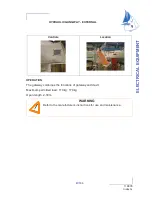
Corsair Foiler 2200 Owner’s Manual - - - - - - - - - - - - - - - - - - - - - - - - - - - - - - - - - - - - - - - - - - - - - - - - - - - - - - - - - - - - - - - - - - - - - - - - - - - - - - - - - - - - - - - - - - - - - - - - - - - - - - - - - - - - - - - - - - - - - - - - - - - - - - - - - - - - - - - - - - - - - - - - - - - - - - - - - - - - - - - - - - - - - - - - - - - - - - - - - - - - - - - - - - - - - - - - - - - - - - - - - - - - - - - - - - - - - - - - - - - - - - - - - - - - - - - - - - - - - - - - - - - - - - - - - - - - - - - - - - - - - - - - - - - - - - - - - - - - - - - - - - - - - - - - - - - - - - - - - - - - - - - - - - - - - - - - - - - - - - - - - - - - - - - - - - - - - - - - - - - - - - - - - - - - - - - - - - - - - 34
The presence of the capacity plate does not relieve the
boat operator from the responsibility of using common
sense or sound judgment. Turbulent waters and
adverse weather conditions will reduce the maximum
load capacity rating of the boat.
After Starting the Engine
1. Upon initial start-up, make sure to follow the
manufacturer's recommendations for the engine
break-in.
2. Check to be sure there is a telltale water stream
exiting the engine.
3. Check the gauges to determine if everything is
normal.
4. Check to make sure everything is secure and
properly stowed away; remember the boat's
movement is dynamic and anything loose will
become a hazard at the worst possible time.
5. Check the emergency stop lanyard to see if it is
properly attached, and that the shift lever is in
the neutral position.
6. Check fuel and oil to make sure you have more
than enough for the planned trip.
Remember the rule of thirds: 1/3 out, 1/3 back, and 1/3
reserve.
Remember that the captain is responsible for the safe-
ty of the crew and Passengers and for his/her boat's
wake damage.
Never operate the boat while under the influence of
alcohol.
Make sure someone else on board knows how to oper-
ate the boat in the event if you are injured and are
unable to operate the boat.
If you are operating the boat for the first time, make
sure you follow the engine manufacturer's break-in
Recommendations. This will assure proper break-in
and reduce the possibility of engine problems.
Never allow anyone to sit on the gunwale while the
boat is moving!
7. You are responsible for any damage or injury
caused by your boat's wake. Observe no wake
speed zone warnings. Operate your boat with
regard for the safety of other boats and people
in your boating area.
8. Keep your engine well turned to decrease
exhaust hydrocarbon emissions that pollute the
air and water.
9. Be a good neighbor. Sounds can carry a long
distance over water, especially at night. Loud
conversations and music can be disturbing to
others as can excessive engine noise. Check
with local authorities regarding any noise
restrictions.
Getting Underway
After clearing the dock, make sure the power trim (if so
equipped) is trimmed down. (This will bring the boat
up on plane More quickly and easily). Give the engine
sufficient throttle to bring it to plane briskly, then back








































